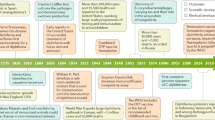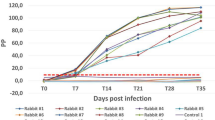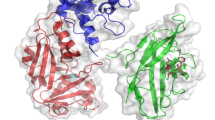Abstract
A SEVERE form of diphtheria, characterized by a high degree of toxæmia and with an apparently haphazard distribution in time and place, has been prevalent during the past fifteen years in Great Britain and in other European countries. The toxæmia in patients with this form of the disease has seemed to be resistant to the curative action of diphtheria antitoxin.
This is a preview of subscription content, access via your institution
Access options
Subscribe to this journal
Receive 51 print issues and online access
$199.00 per year
only $3.90 per issue
Buy this article
- Purchase on Springer Link
- Instant access to full article PDF
Prices may be subject to local taxes which are calculated during checkout
Similar content being viewed by others
References
Anderson, J. S., Happold, F. C., McLeod, J. W., and Thomson, J. G., J. Path. and Bact., 34, 667–681 (1931).
O'Meara, R. A. Q., J. Path. and Bact., 51, 317–335 (1940).
Chain, E., and Duthie, E. S., NATURE, 144, 977 (1939); Favilli, G., NATURE, 145, 866 (1940); McClean, D., and Hale, C. W., NATURE, 145, 869 (1940).
Rights and permissions
About this article
Cite this article
PETRIE, G. The Problem of Hypertoxic Diphtheria. Nature 147, 182–183 (1941). https://doi.org/10.1038/147182a0
Issue Date:
DOI: https://doi.org/10.1038/147182a0
Comments
By submitting a comment you agree to abide by our Terms and Community Guidelines. If you find something abusive or that does not comply with our terms or guidelines please flag it as inappropriate.



